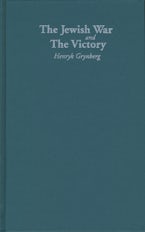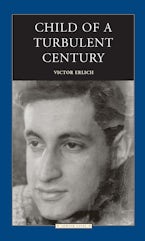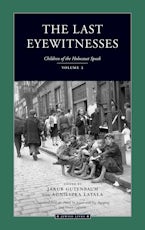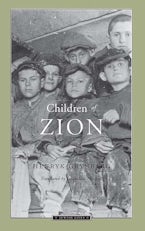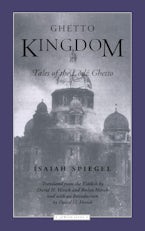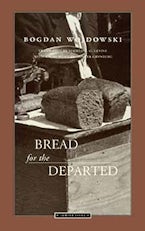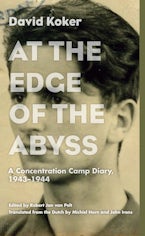Jewish Lives
Primarily memoirs of Holocaust survivors, the Jewish Lives series includes poignant works by Victor Erlich, Ida Fink, Michał Głowiński, Gertrud Kolmar, Arnošt Lustig, Liana Millu, and Jiří Weil, representing an extraordinary range of life experience in the twentieth century in a variety of countries, including Germany, Italy, Poland, and the United States.
Showing results 1-10 of 41
Filter Results OPEN +

The Jewish War and The Victory
This epic tells the story of a Polish Jewish family struggling against nearly insurmountable odds. In The Jewish War, the family of a young Jewish boy hides throughout the countryside until the father is murdered. To escape, the mother and boy use forged papers and adopt a false life as the Catholic family of an officer captured by the Germans. The Victory picks up the story as the Red Army advances and the boy fights to reclaim his Jewishness amidst the horrors of the past and the choices of an agonizing present.
The Last Eyewitnesses
These testimonies, submitted by individual authors and not originally intended for publication, were assembled as a historical record by the Association of the Children of the Holocaust in Poland. While evil and brutal anti-Semitism are described, the accounts also reveal the great risks taken by courageous individuals in order to save Jewish children.
Child of a Turbulent Century
Victor Erlich was born in 1914, at the threshold of what the great Russian poet Anna Akhmatova called "the real twentieth century," in Petrograd, a place indelibly marked by that century's violent dislocations and upheavals. His story, begun on the eve of the First World War and taking him through Russia, Poland, Lithuania, Germany, and the U. S. Army, is in many ways a memoir of that "real twentieth century," reflecting its lethal nature and shaped by the "fearful symmetry" of the age of totalitarianism. To read about Erlich's life growing up at the intersection of the century's darkest currents is to experience history firsthand from the Russian Revolution to the end of the Second World War--and to know what it truly is to be a child of the century. Throughout, despite the darkness, even the horror, of much of what he describes, the author maintains the beguiling tone and the warm...
The Last Eyewitnesses, Volume 2
This book serves as a memorial to loved ones who do not even have a grave, as well as a tribute to those who risked their lives and families to save a Jewish child. A wide variety of experiences during the Nazi occupation of Poland are related with wrenching simplicity and candor, experiences that illustrate horrors and deprivation, but also present examples of courage and compassion.
Children of Zion
In Children of Zion, Henryk Grynberg takes an extraordinary collection of interviews conducted by representatives of the Polish government-in-exile in Palestine in 1943 and arranges them in such a way that their voices become unforgettable. The interviewees--all Polish children--tell of their wartime experiences. Rather than using traditional form, Grynberg has turned their voices into a large "choral" group. The children recall their lives before the war (most were well off), their memories of the war's outbreak and the arrival of the Germans and Russians, and their experiences after leaving work camps and the ways many coped with their lives as orphans.
Medallions
Considered a masterpiece of antifascist world literature, Medallions stands as the culmination of Nalkowska's literary style, a style the Polish writer Witold Gombrowicz once described as "the iron capital of her art and one of the very few exportables in our national literature." More than mere historical record, Medallions offers the reader startling immediacy, the repetition of an event as it persists in the testimonial present, in the scars on the consciousness and conscience of individuals.
Ghetto Kingdom
Isaiah Spiegel was an inmate of the Lodz Ghetto from its inception in 1940 until its liquidation in 1944. While there, he wrote short stories depicting Jewish life in the ghetto and managed to hide them before he was deported to Auschwitz. After being freed, he returned to Lodz to retrieve and publish his stories.
Lala's Story
Winner of 1998 Carl Sandburg Award
Born into a middle-class Jewish family in 1932, Lala Weintraub grew up in Lvov, Poland. When the Nazis came, Lala--who had blond hair and blue eyes--survived by convincing them she was a Christian. This book tells her remarkable story.
Bread for the Departed
Bread for the Departed details the experience of the Jewish community in Warsaw between 1940 and 1942; the final chapters take place during the mass deportation of Warsaw's Jewish community to death camps. Episodic, chaotic as the teeming ghetto itself, the novel records the inexorable breakdown of morals and loyalties that accompanied the physical deterioration of the ghetto population.
At the Edge of the Abyss
Finalist for 2012 National Jewish Book Award in the Holocaust category
During his time in the Vught concentration camp, the 21-year-old David recorded on an almost daily basis his observations, thoughts, and feelings. He mercilessly probed the abyss that opened around him and, at times, within himself. David's diary covers almost a year, both charting his daily life in Vught as it developed over time and tracing his spiritual evolution as a writer. Until early February 1944, David was able to smuggle some 73,000 words from the camp to his best friend Karel van het Reve, a non-Jew.

The Jewish War and The Victory
This epic tells the story of a Polish Jewish family struggling against nearly insurmountable odds. In The Jewish War, the family of a young Jewish boy hides throughout the countryside until the father is murdered. To escape, the mother and boy use forged papers and adopt a false life as the Catholic family of an officer captured by the Germans. The Victory picks up the story as the Red Army advances and the boy fights to reclaim his Jewishness amidst the horrors of the past and the choices of an agonizing present.
The Last Eyewitnesses
These testimonies, submitted by individual authors and not originally intended for publication, were assembled as a historical record by the Association of the Children of the Holocaust in Poland. While evil and brutal anti-Semitism are described, the accounts also reveal the great risks taken by courageous individuals in order to save Jewish children.
Child of a Turbulent Century
Victor Erlich was born in 1914, at the threshold of what the great Russian poet Anna Akhmatova called "the real twentieth century," in Petrograd, a place indelibly marked by that century's violent dislocations and upheavals. His story, begun on the eve of the First World War and taking him through Russia, Poland, Lithuania, Germany, and the U. S. Army, is in many ways a memoir of that "real twentieth century," reflecting its lethal nature and shaped by the "fearful symmetry" of the age of totalitarianism. To read about Erlich's life growing up at the intersection of the century's darkest currents is to experience history firsthand from the Russian Revolution to the end of the Second World War--and to know what it truly is to be a child of the century. Throughout, despite the darkness, even the horror, of much of what he describes, the author maintains the beguiling tone and the warm...
The Last Eyewitnesses, Volume 2
This book serves as a memorial to loved ones who do not even have a grave, as well as a tribute to those who risked their lives and families to save a Jewish child. A wide variety of experiences during the Nazi occupation of Poland are related with wrenching simplicity and candor, experiences that illustrate horrors and deprivation, but also present examples of courage and compassion.
Children of Zion
In Children of Zion, Henryk Grynberg takes an extraordinary collection of interviews conducted by representatives of the Polish government-in-exile in Palestine in 1943 and arranges them in such a way that their voices become unforgettable. The interviewees--all Polish children--tell of their wartime experiences. Rather than using traditional form, Grynberg has turned their voices into a large "choral" group. The children recall their lives before the war (most were well off), their memories of the war's outbreak and the arrival of the Germans and Russians, and their experiences after leaving work camps and the ways many coped with their lives as orphans.
Medallions
Considered a masterpiece of antifascist world literature, Medallions stands as the culmination of Nalkowska's literary style, a style the Polish writer Witold Gombrowicz once described as "the iron capital of her art and one of the very few exportables in our national literature." More than mere historical record, Medallions offers the reader startling immediacy, the repetition of an event as it persists in the testimonial present, in the scars on the consciousness and conscience of individuals.
Ghetto Kingdom
Isaiah Spiegel was an inmate of the Lodz Ghetto from its inception in 1940 until its liquidation in 1944. While there, he wrote short stories depicting Jewish life in the ghetto and managed to hide them before he was deported to Auschwitz. After being freed, he returned to Lodz to retrieve and publish his stories.
Lala's Story
Winner of 1998 Carl Sandburg Award
Born into a middle-class Jewish family in 1932, Lala Weintraub grew up in Lvov, Poland. When the Nazis came, Lala--who had blond hair and blue eyes--survived by convincing them she was a Christian. This book tells her remarkable story.
Born into a middle-class Jewish family in 1932, Lala Weintraub grew up in Lvov, Poland. When the Nazis came, Lala--who had blond hair and blue eyes--survived by convincing them she was a Christian. This book tells her remarkable story.
Bread for the Departed
Bread for the Departed details the experience of the Jewish community in Warsaw between 1940 and 1942; the final chapters take place during the mass deportation of Warsaw's Jewish community to death camps. Episodic, chaotic as the teeming ghetto itself, the novel records the inexorable breakdown of morals and loyalties that accompanied the physical deterioration of the ghetto population.
At the Edge of the Abyss
Finalist for 2012 National Jewish Book Award in the Holocaust category
During his time in the Vught concentration camp, the 21-year-old David recorded on an almost daily basis his observations, thoughts, and feelings. He mercilessly probed the abyss that opened around him and, at times, within himself. David's diary covers almost a year, both charting his daily life in Vught as it developed over time and tracing his spiritual evolution as a writer. Until early February 1944, David was able to smuggle some 73,000 words from the camp to his best friend Karel van het Reve, a non-Jew.
During his time in the Vught concentration camp, the 21-year-old David recorded on an almost daily basis his observations, thoughts, and feelings. He mercilessly probed the abyss that opened around him and, at times, within himself. David's diary covers almost a year, both charting his daily life in Vught as it developed over time and tracing his spiritual evolution as a writer. Until early February 1944, David was able to smuggle some 73,000 words from the camp to his best friend Karel van het Reve, a non-Jew.

